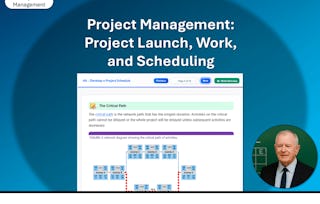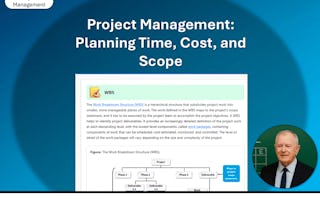Today’s fast track business and global environment emphasizes increasing project development efficiency while using fewer resources. This course shows you how to accomplish exactly this. Learn how to justify and select projects, and how stakeholders can influence projects. Identify the requirements necessary for defining project scope and create a list of tasks necessary to accomplish that scope. Create effective communication plans and assign responsibilities. Gain an understanding of the fundamentals of project planning through the use of scheduling software. Establish project requirements, objectives, and goals before defining the total project scope using a work breakdown structure (WBS). You’ll have the opportunity to apply what you learn to a case study that brings together the key elements of launching a project.

Project Launch

Project Launch
This course is part of Project Management Specialization

Instructor: Stephane Muller
Access provided by RIA PAYMENT INSTITUTION
2,866 already enrolled
18 reviews
Skills you'll gain
- Project Planning
- Project Management
- Stakeholder Management
- Communication
- Agile Project Management
- Leadership and Management
- Communication Planning
- Leadership
- Project Scoping
- Work Breakdown Structure
- Project Schedules
- Feasibility Studies
- Project Coordination
- Requirements Analysis
- Skills section collapsed. Showing 9 of 14 skills.
Details to know

Add to your LinkedIn profile
12 assignments
See how employees at top companies are mastering in-demand skills

Build your subject-matter expertise
- Learn new concepts from industry experts
- Gain a foundational understanding of a subject or tool
- Develop job-relevant skills with hands-on projects
- Earn a shareable career certificate

There are 12 modules in this course
Learn how to justify and select projects and how stakeholders influence projects. Develop requirements necessary to define project scope and create a list of tasks necessary to accomplish the scope. Create effective communication plans and assign responsibilities. Today’s fast track business and global environment places emphasis on how to increase project production efficiency with limited available resources. Gain an understanding of fundamentals of project planning. Establish project requirements, objectives, and goals before defining the total project scope with the use of a Work Breakdown Structure (WBS). This course uses a simulation project— students will start the development of a project plan as demonstration of mastery of key project management practices from this course. The simulation project will continue into the follow-on classes of this program.
What's included
7 videos3 readings1 assignment2 discussion prompts1 plugin
Leadership involves inspiring people while management involves managing things. Both are essential for successful project completion, but many project “managers” don’t know the difference between the two. Leaders provide a vision and a sense of direction; they inspire their team to adopt the vision as their own; they take risks where appropriate; and they see opportunities where others only see problems. Leaders create a safe space for their team members to thrive and produce their best work. This module shows you precisely the difference between “leading” and “managing,” and why knowing the difference is critical for project success.
What's included
4 videos1 reading1 assignment1 discussion prompt
Ever wonder how firms select projects and what is expected from the project? We will review the project selection process, impacts, and implications downstream of project selection.
What's included
6 videos2 readings1 assignment
What's included
4 videos1 assignment1 discussion prompt1 plugin
Now that you have an approved project with a project charter, what’s next? In this module, you will learn how to kick-off a project and review methods in which to engage the project team. We will also review the process of creating a project management plan. And finally, you will learn the fundamentals of the Agile project management approach.
What's included
5 videos1 reading1 assignment1 discussion prompt
Planning with the end product as the starting point is an effective and efficient way of developing a project plan. Learn how the requirements gathering process will help you more successfully define your project deliverables.
What's included
7 videos1 assignment3 discussion prompts1 plugin
The Statement of Work (SOW) may be one of the most powerful tools for project managers. The SOW defines the product or service to be delivered to the customer at the completion of the project as well as defines the work necessary to complete the project. In this module, you will learn to use the information from requirements gathering to create a SOW.
What's included
5 videos2 readings1 assignment1 discussion prompt
It has been said a picture call tell a thousand words. A Work Breakdown Structure (WBS) can be just the picture you need to tell the project team what they need to do on a project. This module will be focused on the structure and formats of a WBS and how to create a WBS including the WBS dictionary. You will be able to translate requirements into actionable activities in a WBS.
What's included
8 videos1 assignment1 discussion prompt
Some say an hour spent in planning results in two hours saved during implementation. Learn how proper planning can reduce the overall level effort for a project. You will have an opportunity to develop a project scope management plan which will be the culminating activity of this course.
What's included
6 videos1 reading1 assignment2 discussion prompts
Stakeholders can have a significant impact to the success of projects. In the module, you will develop skills for identifying stakeholders and ways to manage engagements, activities, and communication with stakeholders.
What's included
7 videos1 assignment2 discussion prompts
The majority of a project manager’s time is devoted to project communication. In this module, you will be exposed to the importance of project communication towards project success. You will have an opportunity to develop a project communication plan.
What's included
9 videos1 reading1 assignment1 discussion prompt
What's included
6 videos1 assignment1 discussion prompt
Earn a career certificate
Add this credential to your LinkedIn profile, resume, or CV. Share it on social media and in your performance review.
Instructor

Offered by
Why people choose Coursera for their career

Felipe M.

Jennifer J.

Larry W.

Chaitanya A.
Explore more from Business

Logical Operations

Logical Operations



